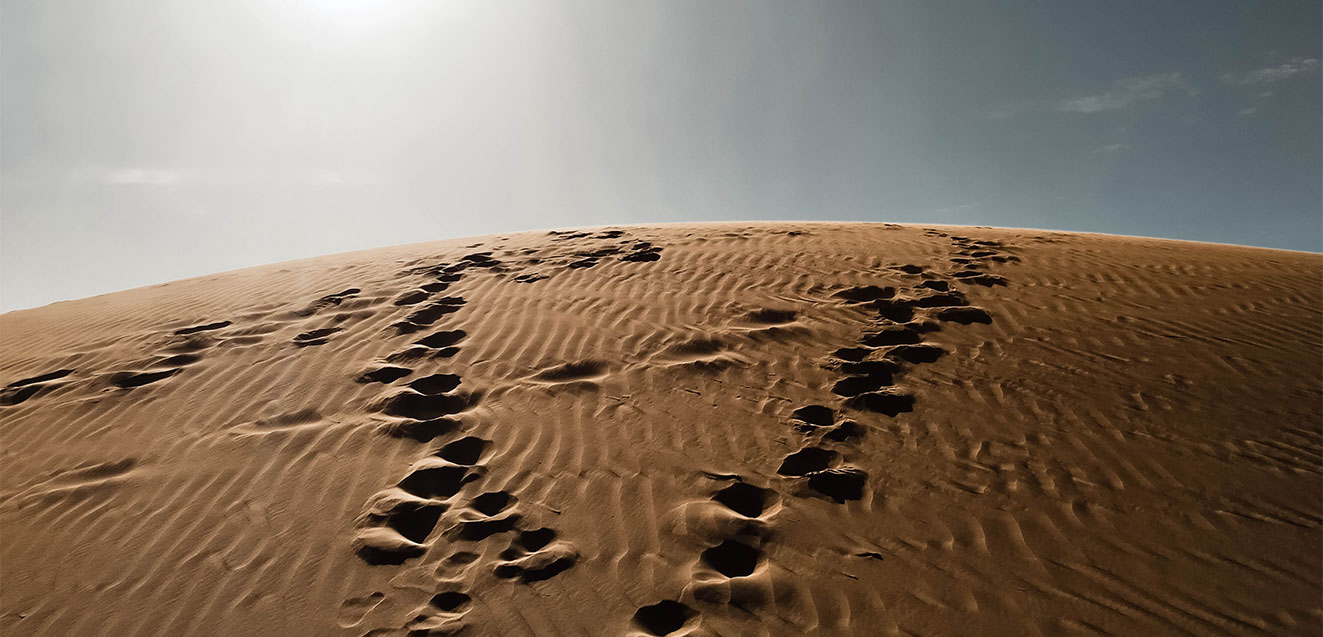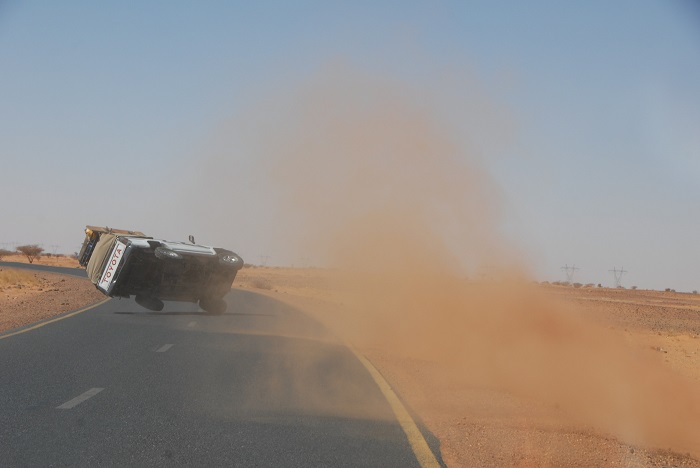A Life-Changing Adventure in the Desert

I am lying in the middle of the road somewhere in the middle of the desert about 100 miles north of Khartoum, Sudan. I feel like I am lying in a frying pan because of the beating heat of the afternoon sun. Next to me is an SUV with blown-out windows and broken doors. I smell fuel leaking out, but I cannot move and every breath I take is like someone stabbing me in the chest. I feel like I am passing out and Leonard Cohen’s song “Closing Time” plays in the back of my mind. The thought that “this might be it for me” begins to take hold. After all these years and extreme adventures in Tibet, Afghanistan, Pakistan, the Arctic, and other wild places, my last breath will be in the desert of Sudan. Somehow I find myself at peace with dying; I just do not want to be paralyzed or to die in a fire.
A few minutes before, we had stopped at a roadside restaurant to have a quick lunch. Then we were on our way again, bound for a camp called Dongola in the desert. As we were speeding along, a strange sound came from the front of the car, we started to swerve and the next thing I knew the car was starting to flip over and over, with glass flying all over the inside and the sound of metal hitting hard on the road filling my mind. We flipped three times before coming to a stop in the middle of the two-lane road. We were very lucky there was no oncoming traffic.
Another SUV that has been following us stops and people run towards me asking if I am okay. I cannot speak due to the pain and they drag me by my feet to the side of the road. My travel mates in the other SUV, from the UK and Spain, are in shock; everyone is trying to help me feel better. It is close to 100 degrees but I feel cold and I am shaking.
The decision is made to take me with the other SUV back to Khartoum to find a hospital there because calling an ambulance will take too long, so they load me in the back of the SUV and we are on our way. I am beginning to fade more and Toby, a wonderful guy from the UK, talks to me trying to keep me awake. After about an hour, we see a red ambulance coming from the opposite direction and the driver stops. We are now in the middle of a small village, and while I am being carried from the SUV to the ambulance, it seems like the whole village comes to watch me. Everyone is talking loudly.
In the ambulance driving towards Khartoum, the male nurse is very attentive; however, he keeps reciting verses from the Koran in my ear and for an atheist like me, this is almost as painful as my broken breathing. But maybe my anger saves me. When we arrive at the first hospital, there are no doctors, so we keep going. Finally at the third hospital there is a doctor, so I am carried into the emergency room. The fun begins here.
There are no dividers between beds. Next to me there is a man who apparently is in his last moments and the doctors are performing a tracheotomy while his family is outside the room wailing and crying. Meanwhile a helper in the emergency room is mopping the blood from the floor as if he is cleaning a water spill from the floor of a restaurant, looking totally bored!
A very nice lady doctor comes in and looks me over and gives me a shot, which makes me feel totally at peace and takes care of most of the pain. They decide to take me for X-rays. As soon as they wheel me to the X-ray room, the machine breaks down, so back out I go. This happens three times and poor Toby, who is still with me, begins to laugh out loud. I am being rolled back and forth between the emergency room and the X-ray room. It’s like being in a Monty Python skit. I can see John Cleese playing the doctor saying, “No. Yes! No. Yes!” I wish I had a video of the experience!
A couple of hours later I decide that I have had enough and want to go back to the hotel to try to recover there in silence.
Staying in the room alone for two days takes its toll on me. I do not like being indoors and cannot even think about getting on a 23-hour flight. I am lying in bed with serious pain with every breath I take; even going to the bathroom is a 15-minute ordeal in planning and rolling on the floor there and back to bed.
The loneliness gives me time to reflect on my life and I realize that this is the seventh time I have had a brush with death. I decide that since no bones are showing outside the skin and I am not vomiting blood, I want try to see what I can of the country anyway. The operator sends a car and I lie in the back and we take off north to meet the others from the small group.
The drive is long. We pass by the scene of the accident in silence, then like in life, we move on. I am in serious pain, but it feels good to see the desert outside the car window.
Sudan is an exotic country, with friendly, hospitable people, and driving through the desert is relaxing to the eyes. Seeing the nomads traveling along with their animals takes you back to a bygone era. The Islamic religion here is not as strict as in other regions. The women don’t cover their faces and readily speak to foreigners. Some houses in the Nubian villages are painted and decorated with colorful patterns and flowers. Enthusiastic hospitality abounds; people will often invite foreigners to visit their home and share a meal or a cup of spiced tea.
We spend two days in a charming small hotel in Karima, a small town located on the right bank of the Nile, close to the famous archaeological site at the foot of Jebel Barkal, south of the 4th Cataract. We visit the Royal Necropolis of the ancient city of Napata, the Nubian capital from 800 to 400 BCE.
Next day we take a wonderful drive through the Bayuda Desert, where we meet groups of Bisharin nomads who live in groups in small huts made of intertwined branches close to the rare water wells, with their caravans and herds of camels and cattle.
In the late afternoon we arrive at Meroe, where we stay in a wonderful tented camp with an incredible view of more than 40 pyramids, located on top of a hill, some of them perfectly preserved, all belonging to the Royal Necropolis of Meroe.
It is nearly full moon and since I cannot lie down and sleep, I walk outside my tent to watch the incredible night sky in the desert. One of my travel mates, Amelia from London, is outside as well and we have a very deep conversation about life and travels to exotic places. It’s interesting how the infinite desert and sky open your soul.
We visit the pyramids the next morning. It is wonderful. Since no other foreigners are there, it feels like visiting Egypt in the 1920s must have felt. Several pyramids stand out with their sharp shapes against the clear sky. Each one has its own funerary chapel with the walls fully decorated with bas-reliefs that show the king’s life and offers to the gods. There are more pyramids in Sudan than in Egypt.
Then we are off for the drive back to Khartoum. On the way we visit a few fascinating archaeological sites in Naga, including a temple dedicated to Apedemak from the 1st century CE: a splendid building with bas-relief decorations depicting the god with a lion’s head, the pharaoh, noblemen, and several ritual images. Then we find a large and fascinating bazaar in a city in the middle of the desert where, strangely, we are not allowed to take pictures. Apparently the government does not want to show the poverty.
We arrive in Khartoum in the late afternoon and at midnight I get on my flight armed with strong pain medication. During the long journey to Frankfurt, the accident plays in my mind over and over in slow motion and something I read long ago creeps into my consciousness: “Live today because you never know what can happen in the future. Tomorrow you may win the lottery or get run over by a bus. Then again tomorrow you may win the lottery AND get run over by a bus!”
Would I go back to Sudan? You bet!
Epilogue: A few days after I got home, a travel mate from Spain sent me a picture. He was taking photos out of his vehicle and caught my SUV in mid-air!


